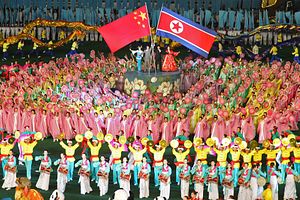After U.S. President Donald Trump’s visit to China, Beijing announced it will send Song Tao, Chinese President Xi Jinping’s special envoy, to North Korea on November 17.
At the regular press conference on November 15, China’s foreign ministry spokesperson Geng Shuang said that Song’s main task in North Korea is to give a briefing on the recently concluded 19th National Congress of the Chinese Communist Party (CCP).
“During the visit, both China and North Korea will also exchange views on issues of common concern such as the relations between the two parties and the two countries,” Geng added.
When being asked if these “issues of common concern” involves North Korea’s nuclear program, Geng didn’t give a direct reply, but insisted that it’s a traditional practice for China to send envoys to other socialist countries after the CCP’s national congress.
China and North Korea, together with Vietnam, Cuba, and Laos, are the only five countries in the world still declaring themselves “socialist states.” Song, who currently holds the position of minister of the international liaison department of the CCP, already visited Vietnam and Laos immediately after the close of the 19th Party Congress.
But the timing of Song’s upcoming visit to North Korea is particularly noteworthy. Actually, when Song’s visit to Vietnam and the Laos was announced earlier, multiple journalists had asked China’s foreign ministry if Song would go to North Korea as well, but the ministry remained ambiguous about the question.
The latest announcement came soon after Trump’s visit to China and days after China’s top leaders attended regional summits, including the APEC and the ASEAN meetings. During these events, North Korea’s nuclear crisis dominated the political agenda. Trump, in particular, repeatedly urged Xi to place more pressure on North Korea during his visit to Beijing as well as on other occasions during his Asia trip. In reply, Xi agreed not to “replicate failed approaches of the past,” according to the White House. The statement also said that both sides agreed to “fully implement all U.N. Security Council resolutions on North Korea and to increase economic pressure until North Korea abandons its reckless and dangerous path.”
To some degree, Song’s upcoming visit — in the name of party-to-party liaison rather than country-to-country diplomacy — can be a good approach to dealing with North Korea. China can use special socialist phrases and ideology to persuade North Korea by reminding Pyongyang of a shared history. If China succeeds, the “party-to-party” approach can both help North Korea to “save face” and reaffirm China’s great achievement with Chinese characteristics.
































